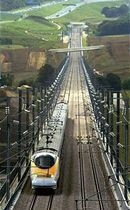 Under a week ago, when James Forsyth wrote about how the government was successfully mobilising third party groups to support high-speed
rail, it looked like Philip Hammond was going to get the neat debate he wanted. The script was simple: the new high speed line was urgently needed and in the national interest, a small number of
people ardently opposed it because it would spoil their views. Since then that message has come unstuck.
Under a week ago, when James Forsyth wrote about how the government was successfully mobilising third party groups to support high-speed
rail, it looked like Philip Hammond was going to get the neat debate he wanted. The script was simple: the new high speed line was urgently needed and in the national interest, a small number of
people ardently opposed it because it would spoil their views. Since then that message has come unstuck.
I think it is understandable that some people are very upset at the aesthetic disruption that could come with HS2. But that isn’t the only objection. Plenty of people who have no particular attachment to Wendover, Aylesbury or Great Missenden are opposed. The loose coalition of those who don’t think the case has been made for the Government’s plans is growing every day. Campaign groups including the TaxPayers’ Alliance (TPA); the RAC Foundation; the Countryside Alliance; and Friends of the Earth. Commentators including Simon Heffer; Peter Oborne; Christian Wolmar; Simon Jenkins; and the leader writers at the Financial Times. The Green Party “overwhelmingly” voted to campaign against the scheme, on the grounds that it won’t cut emissions and has a business case premised on being a “rich person’s railway” (both those claims are accurate). Even the Campaign for Better Transport are warning that it might divert money from local transport projects.
The scheme faces being caught between those who think the cost – at over £1,000 per family overall, and £17 billion just for the London to Birmingham leg – is just too high and those who don’t think it lives up to its billing as a means of making the transport network more sustainable. With such a long list of opponents, can the government stick to this pledge? After all, their u-turns normally mean spending more money and undermining attempts to control the deficit, but this one would strengthen their fiscal credibility.
One argument the Government are really clinging to is the idea that HS2 will create jobs. That argument survives while others fail to stand up to scrutiny because the project probably will bring some jobs. Can you think of any way of spending £17 billion and not creating any jobs? Just burning that much cash in a big bonfire would be a lot of work.
You can’t spend that £17 billion twice though, so the scheme can’t just create some jobs. It has to create a decent number, more than might be created if the money was spent in other ways, whether in the public or private sector. Our research shows that the wider economy could be expected to create four times as many jobs for every pound invested. In other words, there is an opportunity cost of four jobs for every one created by HS2. The scheme is capital intensive, not labour intensive, and selling it as a job creation scheme is just misleading.
The business case doesn’t stand up. There are more affordable options to get the capacity needed on the railway network. The Government should abandon HS2.
Matthew Sinclair is the Director of the Taxpayers’ Alliance.






Comments